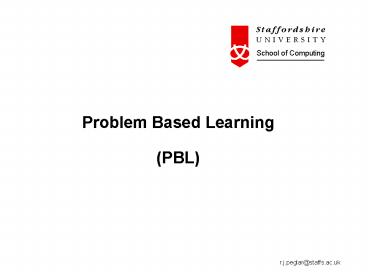Problem Based Learning PBL PowerPoint PPT Presentation
1 / 12
Title: Problem Based Learning PBL
1
Problem Based Learning(PBL)
2
Problem Based Learning (PBL)
- Need for effective problem solvers
- critical thinking and problem solving skills not
always addressed in classroom - Typically 85 of teacher questions are at the
recall or simple comprehension level
3
Problem Based Learning
- Real World problems are ill-defined
- fuzzy edges
- insufficient information
- need the best solution possible within a limited
time frame
4
Problem Solving
- To solve real-world problems we need
- problem solving skills
- knowledge
- other skills
- PBL was pioneered in U.S. Medical Schools
5
Characteristics of PBL
- Reliance on problems to drive the curriculum
- The problems are truly ill-structured
- Students solve the problems typically working in
small groups - Students are only given guidelines for how to
approach problems - Authentic, performance based assessment
6
Role of the Teacher in PBL
- Teachers are coaches and facilitators
- Should NOT direct
- Teachers are NOT disseminators of knowledge (c.f.
most traditional didactic teaching methods)
7
PBL Learning Outcomes
- Clearly define a problem
- Develop alternative hypotheses
- Access, evaluate, and utilize data from a variety
of sources - Alter hypotheses given new information
- Develop clearly stated solutions that fit the
problem and its inherent conditions, based upon
information and clearly explicated reasoning
8
Three Stages of PBL
- Stage 1 Encountering and Defining the Problem
- Stage 2 Accessing, Evaluating and Utilizing
information - Stage 3 Synthesis and Performance
9
PBL Stage 1
- What do I know already about this problem or
question? - What do I need to know to effectively address
this problem or question? - What resources can I access to determine a
proposed solution or hypothesis? - Write a clear problem statement based on answers
to the above
10
PBL Stage 2
- access print, human, or electronic information
resources - evaluate the resource
- Currency
- Authority
- Credibility
- Accuracy
- Bias
11
PBL Stage 3
- Students construct a solution to the problem e.g.
- Prototype
- Presentation
- Paper or essay
- Students must re-organise the information in new
ways
12
References
- Stepien, W.J. and Gallagher, S.A. 1993.
"Problem-based Learning As Authentic as it
Gets." Educational Leadership. 50(7) 25-8 - Barrows, H. (1985) Designing a Problem Based
Curriculum for the Pre-Clinical Years. - Schools of California Online Resources for
Education (http//score.rims.k12.ca.us/index.html)

